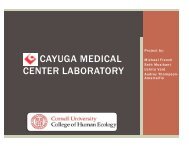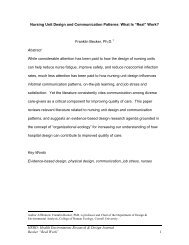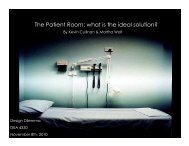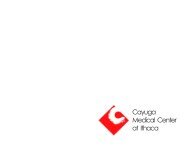The role of physical design and informal communication
The role of physical design and informal communication
The role of physical design and informal communication
You also want an ePaper? Increase the reach of your titles
YUMPU automatically turns print PDFs into web optimized ePapers that Google loves.
interactive <strong>and</strong> interpersonal learning includes intuitive underst<strong>and</strong>ings <strong>of</strong> “how we do<br />
things here.”<br />
1.8.1 Impact <strong>of</strong> Informal Learning on the Graduate Nurses Experience<br />
Currently a range <strong>of</strong> “formal” learning strategies aimed at easing the graduate<br />
nurse transition are being implemented, including orientation programs, internships,<br />
<strong>and</strong> the use <strong>of</strong> a preceptor (Godinez, Schweiger, Gruver, & Ryan, 1999). Although<br />
these programs can be beneficial in terms <strong>of</strong> increasing clinical competencies <strong>and</strong><br />
reducing nurse turnover, they can be expensive. Maiocco (2003) provides estimates<br />
ranging from $18,000 for an 8-week orientation period to $25,000 for a 12-week<br />
period. She also states that orientation programs are not only costly in terms <strong>of</strong><br />
dollars, but also in terms <strong>of</strong> experienced nurses’ time <strong>and</strong> energy, now at a premium<br />
due to the nursing shortage. However, formal learning strategies may not be the only<br />
solution to the problem.<br />
Informal learning opportunities may also facilitate the gaining <strong>of</strong> competencies<br />
among new nurse graduates. By overemphasizing the importance <strong>of</strong> formal learning<br />
strategies <strong>and</strong> failing to realize the value in <strong>informal</strong>, participatory learning, an<br />
organization can “undercut the various processes by which they can become effective<br />
learning organizations” (Wenger, 1999). <strong>The</strong> communities <strong>of</strong> practice perspective can<br />
be applied to the healthcare organization: Opportunities for <strong>informal</strong>, on-the-job<br />
learning <strong>and</strong> opportunistic <strong>communication</strong> - such as impromptu questions asked while<br />
passing a preceptor in the corridor or striking a spontaneous conversation while<br />
engaged in another task at the nurses’ station - may help to increase graduate nurse<br />
competencies, thereby reducing levels <strong>of</strong> stress.<br />
16







